Susan G. Amara, PhD
 Susan G. Amara is the Scientific Director of the National
Institute of Mental Health intramural research program at NIH. She joined NIMH after serving as the Thomas Detre Professor of Neurobiology and Distinguished Professor at the University of Pittsburgh School of Medicine. Work in her laboratory has focused
on the structure, pharmacology and cellular physiology of neurotransmitter transporters, including the biogenic amine transporters, primary targets for psychostimulant drugs and antidepressants. After deciding to become a pharmacologist during an
8th grade field trip to a drug company lab, she received a BS in Biological Sciences from Stanford and a PhD in Physiology and Pharmacology from UC San Diego. She has previously held faculty positions at the Yale School of Medicine, at the Vollum
Institute in Portland, Oregon and as a Howard Hughes Medical Institute Investigator at Yale and in Oregon.
Susan G. Amara is the Scientific Director of the National
Institute of Mental Health intramural research program at NIH. She joined NIMH after serving as the Thomas Detre Professor of Neurobiology and Distinguished Professor at the University of Pittsburgh School of Medicine. Work in her laboratory has focused
on the structure, pharmacology and cellular physiology of neurotransmitter transporters, including the biogenic amine transporters, primary targets for psychostimulant drugs and antidepressants. After deciding to become a pharmacologist during an
8th grade field trip to a drug company lab, she received a BS in Biological Sciences from Stanford and a PhD in Physiology and Pharmacology from UC San Diego. She has previously held faculty positions at the Yale School of Medicine, at the Vollum
Institute in Portland, Oregon and as a Howard Hughes Medical Institute Investigator at Yale and in Oregon.
Amara has had the pleasure of training postbaccalaureate, predoctoral and postdoctoral scientists for the past 35 years. At NIMH, she has been strongly committed to furthering the careers of scientists and clinician scientists who can advance our knowledge
on causes of brain diseases and develop new paths for therapeutic intervention. An ASPET member since 1994, she has served on the Program Committee, Nominating Committee, various award selection committees and as Secretary Treasurer (2008-2009).
Amara has received a Burroughs Wellcome Hitchings Award in Drug Discovery, the Society for Neuroscience Young Investigator Award, the ASPET John Jacob Abel Award, a McKnight Neuroscience Investigator Award, a MERIT Award from NIDA, the Julius Axelrod
Award from ASPET and the Julius Axelrod Prize from the Society for Neuroscience. She is a member of the National Academy of Sciences (2004), a fellow of the AAAS (2007) and is a past-President of the Society for Neuroscience (2011).
James E. Barrett, PhD
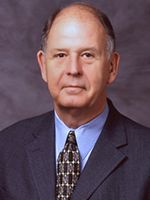 James E. Barrett is Emeritus Professor, Drexel University
College of Medicine, and is currently Professor in the Center for Substance Abuse Research, Temple University School of Medicine. He received his PhD from Pennsylvania State University followed by postdoctoral training at the Worcester Foundation
for Experimental Biology with Dr. James W. McKearney. He served on the faculty at the University of Maryland and the Uniformed Services University of the Health Sciences prior to moving to the pharmaceutical industry, first at Lilly and then Lederle
Research Laboratories. Following a merger, he joined Wyeth as Vice President of Neuroscience Discovery Research. He also served as Senior Vice President, Chief Scientific Officer, and President of Research at Adolor Corporation, a company
focused on pain pharmaceuticals, moving there from Memory Pharmaceuticals, a biopharmaceutical company founded by the Nobel Laureate Eric Kandel.
James E. Barrett is Emeritus Professor, Drexel University
College of Medicine, and is currently Professor in the Center for Substance Abuse Research, Temple University School of Medicine. He received his PhD from Pennsylvania State University followed by postdoctoral training at the Worcester Foundation
for Experimental Biology with Dr. James W. McKearney. He served on the faculty at the University of Maryland and the Uniformed Services University of the Health Sciences prior to moving to the pharmaceutical industry, first at Lilly and then Lederle
Research Laboratories. Following a merger, he joined Wyeth as Vice President of Neuroscience Discovery Research. He also served as Senior Vice President, Chief Scientific Officer, and President of Research at Adolor Corporation, a company
focused on pain pharmaceuticals, moving there from Memory Pharmaceuticals, a biopharmaceutical company founded by the Nobel Laureate Eric Kandel.
Dr. Barrett returned to academia and served as Chair of the Department of Pharmacology and Physiology at Drexel, where he was also the Founding Director of the Drug Discovery and Development Program and of the Clinical and Translational Research Institute.
He has published more than 300 scientific articles, books and abstracts in the areas of substance abuse, neuropharmacology, pain, behavioral pharmacology, translational research and neuroscience. Dr. Barrett is currently Editor-in-Chief of the Handbook of Experimental Pharmacology, one
of the most authoritative and influential series in pharmacology, with a 100-year history of contributions to the discipline. He also served as Chair of the Board of Publication Trustees and Treasurer for ASPET, and was on the Board of Directors
for the Federation of American Societies for Experimental Biology (FASEB), where he was a member of the Science Policy Committee, the Public Affairs Committee, as well as Chair of the “Breakthrough Series in Science” and “Horizons
in Bioscience”.
Dr. Barrett was President of the Behavioral Pharmacology Society and of the American Society for Pharmacology and Experimental Therapeutics (ASPET). He is the recipient of the Solvay-Duphar Award for Research on Affective Disorders, the George B.
Koelle Award from the Mid-Atlantic Pharmacology Society for contributions to teaching and research, and the P.B. Dews Lifetime Achievement Award for Research in Behavioral Pharmacology. He also received the Torald Sollmann Award in Pharmacology for
significant contributions to the advancement and extension of knowledge in the field of pharmacology. Dr. Barrett has served as the President of the Association of Medical School Pharmacology Chairs, Councilor and now Treasurer, International Union
of Basic and Clinical Pharmacology (IUPHAR). He is a Fellow of the American College of Neuropsychopharmacology. His current research emphasis is on pain, basic mechanisms and biomarkers, and on the development of new therapeutics for pain disorders
emerging from academic research.
David B. Bylund
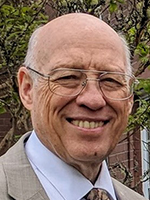 After undergraduate studies at the California Institute
of Technology and Brigham Young University, David B. Bylund earned his PhD in Biochemistry from the University of California, Davis. His advisor was Dr. Edwin G. Krebs, who became a Nobel Laureate for his discovery of Cyclic AMP-Dependent Protein
Kinase. In 1975, Dr. Bylund joined the laboratory of Dr. Solomon H. Snyder at Johns Hopkins University. As a postdoctoral fellow, he made major contributions to identification of alpha and beta adrenergic receptors using the then new radioligand binding
technique.
After undergraduate studies at the California Institute
of Technology and Brigham Young University, David B. Bylund earned his PhD in Biochemistry from the University of California, Davis. His advisor was Dr. Edwin G. Krebs, who became a Nobel Laureate for his discovery of Cyclic AMP-Dependent Protein
Kinase. In 1975, Dr. Bylund joined the laboratory of Dr. Solomon H. Snyder at Johns Hopkins University. As a postdoctoral fellow, he made major contributions to identification of alpha and beta adrenergic receptors using the then new radioligand binding
technique.
In 1977, Dr. Bylund joined the department of pharmacology at the University of Missouri, Columbia, where his research led to the discovery of the three subtypes of the alpha-2 adrenergic receptors. This work laid the foundation for the development of
subtype selective alpha-2 adrenergic agents. His later work at the University of Nebraska Medical Center led to the understanding of the importance of the developing adrenergic system in childhood and adolescent depression. He is an ISI highly cited
researcher in Pharmacology.
Dr. Bylund has been an enthusiastic mentor of junior colleagues both in his own laboratory and as Chair of the Department of Pharmacology at the University of Nebraska. He has trained 10 graduate students and 6 postdoctoral research fellows, as well as
multiple junior faculty member in his Department. He also trained many students in the principles of Integrative and Organ Pharmacology as the Principal Investigator of a long running NIH-funded short course.
An invaluable member of ASPET for 40 years, Dr. Bylund served as President of ASPET from 2003-2004, Treasurer of ASPET from 1999-2002 and he was on the Board of Directors of FASEB from 2003-2007. He edited Pharmacological Reviews for the Society from
1995-2001, and served as a Board member or Associate Editor of the Journal of Pharmacology and Experimental Therapeutics from 1981 to 2007.
Christine K. Carrico, PhD
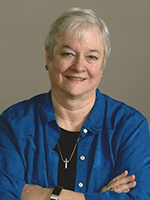 Christie Carrico earned her BA degree in Chemistry
from Hollins College (now University) and her PhD in Pharmacology from Yale University, where her thesis professor was Dr. Alan Sartorelli. She won a competitive Pharmacology Research Associate (PRAT) fellowship to work in the lab of Dr. David
Johns at the National Cancer Institute from 1977-1979, where she expanded her thesis research investigating the effect of nucleotide analogs on messenger RNA in an attempt to devise more effective and less toxic dosing regimens.
Christie Carrico earned her BA degree in Chemistry
from Hollins College (now University) and her PhD in Pharmacology from Yale University, where her thesis professor was Dr. Alan Sartorelli. She won a competitive Pharmacology Research Associate (PRAT) fellowship to work in the lab of Dr. David
Johns at the National Cancer Institute from 1977-1979, where she expanded her thesis research investigating the effect of nucleotide analogs on messenger RNA in an attempt to devise more effective and less toxic dosing regimens.
In 1979, Dr. Carrico went to work in the Pharmacological Sciences Program of the National Institute of General Medical Sciences where she handled research and training grants in pharmacology and anesthesiology. In 1984, she was promoted to the Senior
Executive Service to be Director of the Pharmacological Sciences program where she oversaw research, center, and program project grants in pharmacology, anesthesiology, and bio-related chemistry. She was also in charge of training and postdoctoral
fellow grants in pharmacology, clinical pharmacology and biotechnology. During this time Dr. Carrico also ran the Pharmacology Research Associate program, an NIH in-house postdoctoral fellowship program and she was the original project officer
for GenBankR.
In 1993, Dr. Carrico left the NIH to become Scientific Director for the American Association of Pharmaceutical Scientists. She became the Executive Officer of ASPET in 1997. During her tenure, ASPET journals management was brought in-house,
the Summer Undergraduate Research Fellow program was strengthened, and a postdoctoral fellow membership category was created. Dr. Carrico oversaw the creation and empowerment of the ASPET divisions, the birth and demise of Molecular Interventions,
and the hosting of the 2002 IUPHAR Congress in San Francisco. She oversaw the organization of programming and all other events for the ASPET annual meeting. Dr. Carrico retired from ASPET in 2014 after 17 years as Executive Officer.
William A. Catterall, PhD
 Bill Catterall received his BA in Chemistry
from Brown University in 1968, his PhD in Physiological Chemistry from Johns Hopkins in 1972, and postdoctoral training in neurobiology and molecular pharmacology as a Muscular Dystrophy Association Fellow with Nobel Laureate Marshall Nirenberg
at the National Institutes of Health from 1972 to 1974. Following three years as a staff scientist at NIH, he joined the University of Washington in 1977 as Associate Professor of Pharmacology, became Professor in 1981 and Chair in 1984.
Bill Catterall received his BA in Chemistry
from Brown University in 1968, his PhD in Physiological Chemistry from Johns Hopkins in 1972, and postdoctoral training in neurobiology and molecular pharmacology as a Muscular Dystrophy Association Fellow with Nobel Laureate Marshall Nirenberg
at the National Institutes of Health from 1972 to 1974. Following three years as a staff scientist at NIH, he joined the University of Washington in 1977 as Associate Professor of Pharmacology, became Professor in 1981 and Chair in 1984.
Catterall discovered the voltage-gated sodium and calcium channel proteins, which initiate electrical and chemical signaling in excitable cells. These ion channels are targets for drugs used in local anesthesia, chronic pain, cardiac arrhythmia, hypertension,
and epilepsy. His work contributed much to understanding structure, function, regulation, and molecular pharmacology of these ion channels as well as their roles in diseases. His recent studies reveal the structures of these ion channels at high
resolution and map receptor sites for sodium and calcium channel-blocking drugs at the atomic level.
As Chair of Pharmacology from 1984 to 2016, Catterall led an internationally recognized research and educational program. He served as Editor and Editorial Board Member of Molecular Pharmacology, longstanding member of ASPET’s Board
of Publication Trustees, founding member of the ASPET Division for Molecular Pharmacology, and founding Editor of IUPHAR’s Ion Channel Compendium and Database.
Catterall is a member of the National Academy of Science and National Academy of Medicine, the American Academy of Arts & Sciences, and the Royal Society of London. He was Chair of the Section on Physiology & Pharmacology of the National Academy
of Science from 1998-2001. He has received numerous awards, including the Bristol-Myers Squibb Award for Distinguished Research in Neuroscience, the Sharpey-Schaffer Prize of the Physiological Society/UK, the Robert Ruffolo Award of ASPET, and
the Gairdner International Award of Canada.
Sue Piper Duckles, PhD
 Sue Duckles received her BA in philosophy from the University of California at Berkeley and her PhD from the University of California at San Francisco. Following postdoctoral work and an assistant professorship at UCLA, she moved
to the University of Arizona’s Department of Pharmacology until her move to Irvine in 1985. She is currently professor emerita in the Department of Pharmacology at the University of California at Irvine School of Medicine.
Sue Duckles received her BA in philosophy from the University of California at Berkeley and her PhD from the University of California at San Francisco. Following postdoctoral work and an assistant professorship at UCLA, she moved
to the University of Arizona’s Department of Pharmacology until her move to Irvine in 1985. She is currently professor emerita in the Department of Pharmacology at the University of California at Irvine School of Medicine.
Dr. Duckles has been an ASPET member since 1979. She has provided outstanding leadership to the discipline of pharmacology, serving ASPET as president and councilor and on many committees over several decades. She was also the chair
of the Molecular Interventions Executive Committee and served on the Board of Publications Trustees. Dr. Duckles was a recipient of the ASPET Torald Sollmann Award in Pharmacology (2007) and the Paul M. Vanhoutte Award in Vascular
Pharmacology (2014).
Dr. Duckles served as president, secretary general and general assembly delegate of the International Union of Pharmacology (IUPHAR). She was congress president for the XIVth World Congress of Pharmacology. She is an honorary fellow of the British
Pharmacological Society.
She is renowned for her devotion to mentoring and her training and advocacy of junior scientists, not just those in her department but also young scientists who would meet or seek her out at scientific meetings where
she earned a deserved reputation as an encouraging and supportive mentor for all.
Dr.Duckles’ discoveries in cerebrovascular pharmacology have added significantly to our understanding of the function of the endothelium and vascular smooth muscle cells in cerebral arteries. Her work has also added to our understanding of the
effects of sex hormones on the cerebral vasculature, focusing not only on the effects of estrogen but also on the delicate balance of the effects of estrogens and androgens. Dr. Duckles’ more recent studies on the impact of estrogen on mitochondrial
function in cerebral arteries are groundbreaking.
S. J. Enna, PhD
 S. J. Enna received MS and PhD degrees in Pharmacology
from the University of Missouri-Kansas City. Postdoctoral training was completed at the University of Texas Southwestern and Johns Hopkins Medical Schools, as well as F. Hoffmann‑La Roche in Basel, Switzerland. Dr. Enna spent a decade on
the faculty at the University of Texas Medical School at Houston, and from 1986‑1992 was Senior Vice President and Scientific Director of Nova Pharmaceutical Corporation in Baltimore. From 1992 to 2003 he was chair of Pharmacology at the
University of Kansas Medical School, where he is now Associate Dean for Research and Graduate Education and Professor of Physiology and of Pharmacology. Other academic appointments included Lecturer in Neuroscience at Johns Hopkins University
School of Medicine and Adjunct Professor of Pharmacology at Tulane University Medical School.
S. J. Enna received MS and PhD degrees in Pharmacology
from the University of Missouri-Kansas City. Postdoctoral training was completed at the University of Texas Southwestern and Johns Hopkins Medical Schools, as well as F. Hoffmann‑La Roche in Basel, Switzerland. Dr. Enna spent a decade on
the faculty at the University of Texas Medical School at Houston, and from 1986‑1992 was Senior Vice President and Scientific Director of Nova Pharmaceutical Corporation in Baltimore. From 1992 to 2003 he was chair of Pharmacology at the
University of Kansas Medical School, where he is now Associate Dean for Research and Graduate Education and Professor of Physiology and of Pharmacology. Other academic appointments included Lecturer in Neuroscience at Johns Hopkins University
School of Medicine and Adjunct Professor of Pharmacology at Tulane University Medical School.
Dr. Enna served for six years as editor of The Journal of Pharmacology and Experimental Therapeutics and is currently co-editor of Current Protocols in Pharmacology, Editor-in-Chief of Biochemical Pharmacology, Executive
Editor-in-Chief of Pharmacology and Therapeutics, and Series Editor of Advances in Pharmacology.
Dr. Enna made significant contributions in defining the pharmacological and biochemical properties of neurotransmitter receptors, in particular those for GABA. He conducted research into the effects of hormones on neurotransmitter receptor function
and receptor responses to psychotherapeutics, and the identification of the cellular components of coincident signaling in brain. His research is described in over 250 published articles and he has authored or edited over three dozen books on
topics ranging from neuropharmacology in general, to neurotransmitter receptors and GABA.
Honors received include the John Jacob Abel and Torald Sollmann Awards from ASPET, the Daniel H. Efron Award from the American College of Neuropsychopharmacology, a PhARMA Foundation Excellence Award, the Paoletti Medal from the European Pharmacology
Society.
Elective offices have included Secretary-Treasurer and President of ASPET, as well as Secretary General and President of the International Union of Basic and Clinical Pharmacology (IUPHAR).
Annette E. Fleckenstein, PhD
 Annette Fleckenstein earned her
BS and MS in Biomedical and Biological Sciences, respectively, from Western Michigan University. She then earned her PhD from the Department of Pharmacology and Toxicology at Michigan State University. After an Intramural Training
Award postdoctoral fellowship at the National Institute on Drug Abuse (NIDA), she transitioned to the University of Utah as a postdoctoral fellow in the Department of Pharmacology and Toxicology. She eventually became a tenured Professor
in that Department. In 2014, Dr. Fleckenstein transitioned to the University of Utah School of Dentistry (SOD). She is currently a tenured Professor, the Section Head for Oral Biology/Medicine/Pathology, and the Assistant Dean
for Basic Science Integration at the University of Utah SOD. She is also a Professor in the Interdepartmental Program in Neuroscience at the University of Utah.
Annette Fleckenstein earned her
BS and MS in Biomedical and Biological Sciences, respectively, from Western Michigan University. She then earned her PhD from the Department of Pharmacology and Toxicology at Michigan State University. After an Intramural Training
Award postdoctoral fellowship at the National Institute on Drug Abuse (NIDA), she transitioned to the University of Utah as a postdoctoral fellow in the Department of Pharmacology and Toxicology. She eventually became a tenured Professor
in that Department. In 2014, Dr. Fleckenstein transitioned to the University of Utah School of Dentistry (SOD). She is currently a tenured Professor, the Section Head for Oral Biology/Medicine/Pathology, and the Assistant Dean
for Basic Science Integration at the University of Utah SOD. She is also a Professor in the Interdepartmental Program in Neuroscience at the University of Utah.
Dr. Fleckenstein’s research has focused on psychostimulant-induced modifications of monoamine transport, and the implications of these alterations for neurotoxicity and neuroprotection. She has been a NIDA-funded researcher for over 20
years, has served on multiple National Institutes of Health review panels, and has authored numerous publications in peer-reviewed journals.
Dr. Fleckenstein has been the principal mentor for many undergraduate, graduate and post-doctoral trainees. She continues to teach a wide variety of pharmacological topics to dental students. Additionally, she is a co-author of the textbook,
“Drugs and Society.”
Dr. Fleckenstein was awarded a Kenneth E. Moore Distinguished Alumna Award from the Department of Pharmacology and Toxicology at Michigan State University, and a Distinguished Alumna award from the College of Arts and Sciences (Biological Sciences)
at Western Michigan University. She is a Fellow of the American College of Neuropsychopharmacology. Dr. Fleckenstein has served the American Society for Pharmacology and Experimental Therapeutics in several capacities, including
as its Secretary/Treasurer and President.
Michael M. Gottesman, MD
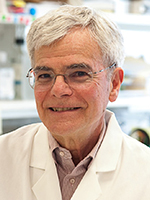 Michael Gottesman has been Deputy Director
for Intramural Research at NIH since 1993. A graduate of Harvard College and Harvard Medical School, Dr. Gottesman completed an internship and residency at the Peter Bent Brigham Hospital in Boston, and was a research associate at NIH from 1971
to 1974. He returned to Harvard Medical School as an assistant professor in the Department of Anatomy before returning to NIH in 1976. Michael became Chief of the Laboratory of Cell Biology in the National Cancer Institute in 1990. From
1992 to 1993, he was Acting Director and Acting Scientific Director of the National Center for Human Genome Research. He is an elected fellow of the AAAS, the American Association of Physicians, and ASPET, and is a member of the National Academy
of Medicine, the American Academy of Arts and Sciences, and the National Academy of Sciences. He has been an ASPET member since 1996, received the ASPET award in 1997 for his work on ABC transporters, and served on the ASPET Award Committee from
2001-2004.
Michael Gottesman has been Deputy Director
for Intramural Research at NIH since 1993. A graduate of Harvard College and Harvard Medical School, Dr. Gottesman completed an internship and residency at the Peter Bent Brigham Hospital in Boston, and was a research associate at NIH from 1971
to 1974. He returned to Harvard Medical School as an assistant professor in the Department of Anatomy before returning to NIH in 1976. Michael became Chief of the Laboratory of Cell Biology in the National Cancer Institute in 1990. From
1992 to 1993, he was Acting Director and Acting Scientific Director of the National Center for Human Genome Research. He is an elected fellow of the AAAS, the American Association of Physicians, and ASPET, and is a member of the National Academy
of Medicine, the American Academy of Arts and Sciences, and the National Academy of Sciences. He has been an ASPET member since 1996, received the ASPET award in 1997 for his work on ABC transporters, and served on the ASPET Award Committee from
2001-2004.
Michael’s laboratory identified the human gene that causes cancer cells to resist many anticancer drugs by pumping these drugs out of drug-resistant human cancers and has used this information to develop strategies to circumvent drug resistance
in cancer. These studies of ABC transporters also have important implications for uptake, distribution, and excretion of many commonly used drugs.
In his job overseeing the intramural research program at the NIH, Michael has initiated several training and mentoring programs for high school, college, post-baccalaureate, medical, and graduate students. He has also instituted training programs
for students from disadvantaged populations, programs to advance the careers of women scientists, loan repayment programs for clinical researchers at NIH, and a clinical research training program for early career clinical investigators.
Frederick P. Guengerich, PhD
 F. Peter Guengerich is the Tadashi
Inagami Professor of Biochemistry at Vanderbilt University School of Medicine. He received his PhD in Biochemistry from Vanderbilt in 1973 (Prof. H. P. Broquist), was a research fellow at the University of Michigan (Prof. M. J. Coon), and
joined the faculty at Vanderbilt in 1975 (Professor since 1983). His research deals with the chemical and biological mechanisms by which molecules are processed and the relevance to drug development, toxicity, and disease. A major area of
interest is the cytochrome P450 enzymes, which are the major catalysts involved in the metabolism of drugs, carcinogens, and steroids. He is an author/co-author of 724 original research articles, 278 invited reviews, and 137 proceedings chapters.
F. Peter Guengerich is the Tadashi
Inagami Professor of Biochemistry at Vanderbilt University School of Medicine. He received his PhD in Biochemistry from Vanderbilt in 1973 (Prof. H. P. Broquist), was a research fellow at the University of Michigan (Prof. M. J. Coon), and
joined the faculty at Vanderbilt in 1975 (Professor since 1983). His research deals with the chemical and biological mechanisms by which molecules are processed and the relevance to drug development, toxicity, and disease. A major area of
interest is the cytochrome P450 enzymes, which are the major catalysts involved in the metabolism of drugs, carcinogens, and steroids. He is an author/co-author of 724 original research articles, 278 invited reviews, and 137 proceedings chapters.
In the period 1993-2003 he was the third-most highly cited (ISI) author in Pharmacology and Toxicology. Dr. Guengerich has served on numerous committees in ASPET, particularly in the Division for Drug Metabolism and Disposition. He was an associate
editor for Molecular Pharmacology (1982-1985) and is currently an associate editor of The Journal of Biological Chemistry (also Deputy Editor). In 1984 he received the John J. Abel Award and in 1992 he received the B. B.
Brodie Award from ASPET. In 2005 he received the William C. Rose Award from ASBMB and has received numerous other awards from the American Chemical Society, Society of Toxicology, ISSX, and other toxicology societies.
Prof. Guengerich has trained 21 graduate students and 137 postdoctoral fellows/visiting scientists and received three Vanderbilt mentoring awards for his work with postdoctoral fellows, one of which is now named for him and awarded biennially.
Many of his trainees have continued in the field in both academia and the pharmaceutical industry throughout the world.
James R. Halpert, PhD
 James Halpert earned his PhD in biochemistry
from Uppsala University, Sweden in 1977, where he worked with Dr. David Eaker and determined the first primary structure of a presynaptic snake venom neurotoxin. Dr. Halpert then earned an MS in Toxicology from the Karolinska Institute
in 1978, working with Dr. Magnus Ingelman-Sundberg on epoxide hydrolase. He next joined the laboratory of Dr. Robert A. Neal at Vanderbilt University to elucidate mechanisms of cytochrome P450 inhibition.
James Halpert earned his PhD in biochemistry
from Uppsala University, Sweden in 1977, where he worked with Dr. David Eaker and determined the first primary structure of a presynaptic snake venom neurotoxin. Dr. Halpert then earned an MS in Toxicology from the Karolinska Institute
in 1978, working with Dr. Magnus Ingelman-Sundberg on epoxide hydrolase. He next joined the laboratory of Dr. Robert A. Neal at Vanderbilt University to elucidate mechanisms of cytochrome P450 inhibition.
In 1983, Dr. Halpert joined the Department of Pharmacology and Toxicology at the University of Arizona and began his independent research on the structural basis of cytochrome P450 selectivity, which was supported continuously by the NIH for 33
years, including a MERIT Award. His initial work in Arizona was supported by a Faculty Development Award from the PhRMA Foundation, which recognized him again in 2016 with an Award in Excellence.
Subsequent leadership positions include Chair of the Department of Pharmacology and Toxicology at the University of Texas Medical Branch; Associate Dean for Scientific Affairs at UC San Diego’s Skaggs School of Pharmacy and Pharmaceutical
Sciences; Dean of the University of Connecticut School of Pharmacy. Dr. Halpert has trained 10 PhD students and ~40 post-doctoral fellows, visiting scientists, and research-track faculty. Ten former trainees hold independent faculty
positions. Emily Scott, a former post-doc now a Professor at the University of Michigan, said “Jim always encouraged and generously supported all phases of my scientific and professional development, ranging from obtaining advanced
technical training in X-ray structure determination to meeting the leaders in our field”.
In 2010 Dr. Halpert was the recipient of the Bernard B. Brodie Award in Drug Metabolism from ASPET. Highlights of professional service include: chairman of the NIH Pharmacology Study Section;Editor of Drug Metabolism and Disposition;
Secretary-Treasurer and President of ASPET; Treasurer of ISSX.
Paul F. Hollenberg, PhD
 Paul F. Hollenberg is currently Professor
Emeritus of Pharmacology at the University of Michigan Medical School. He received his PhD in Biological Chemistry from the University of Michigan, where he was a graduate student with Dr. M.J. (Jud) Coon. He was a Postdoctoral
Fellow with Dr. Lowell Hager in the Department of Biochemistry at the University of Illinois, Champaign-Urbana from 1969-1972. In 1972 he was appointed Assistant Professor of Biochemistry at Northwestern University Medical and Dental
Schools and became Professor of Pathology and Molecular Biology in 1984. In 1987 he moved to Wayne State University School of Medicine as Professor and Chair of Pharmacology. He became Maurice Seevers Collegiate Professor and Chair
of Pharmacology at the University of Michigan Medical School in 1994, stepped down as Chair in 2014, and retired in 2016.
Paul F. Hollenberg is currently Professor
Emeritus of Pharmacology at the University of Michigan Medical School. He received his PhD in Biological Chemistry from the University of Michigan, where he was a graduate student with Dr. M.J. (Jud) Coon. He was a Postdoctoral
Fellow with Dr. Lowell Hager in the Department of Biochemistry at the University of Illinois, Champaign-Urbana from 1969-1972. In 1972 he was appointed Assistant Professor of Biochemistry at Northwestern University Medical and Dental
Schools and became Professor of Pathology and Molecular Biology in 1984. In 1987 he moved to Wayne State University School of Medicine as Professor and Chair of Pharmacology. He became Maurice Seevers Collegiate Professor and Chair
of Pharmacology at the University of Michigan Medical School in 1994, stepped down as Chair in 2014, and retired in 2016.
Dr. Hollenberg has been an active member of ASPET for more than 35 years. He was Secretary/Treasurer of ASPET in 1997-1998 and President in 2002-2003. He was an Associate Editor for the Journal of Pharmacology and Experimental Therapeutics and on the Editorial Board of Drug Metabolism and Disposition.
Dr. Hollenberg’s major research contributions have been related the mechanisms of action of the cytochromes P450; mechanism-based inactivators; and the role of the human P450 isozymes in the metabolism of drugs, chemical carcinogens and
other toxic agents. He has trained more than 60 graduate students, postdoctoral fellows, and visiting scientists.
He was elected a Fellow of the American Chemical Society (2010) and the American Association for the Advancement of Science (2012). He has received a number of awards including the Scientific Achievement Award from the International Society for
the Study of Xenobiotics in 2011, the Founders Award from the Division of Chemical Toxicology of the American Chemical Society in 2014, and the Otto Krayer Award from ASPET in 2018.
Paul A. Insel, MD
 Paul A. Insel received his MD from the University
of Michigan, subsequent clinical training on the Harvard Medical Service/Boston City Hospital and research training at NIH and the University of California, San Francisco. Since 1978, he has been on the faculty at the University of California,
San Diego (UCSD) and is currently Distinguished Professor of Pharmacology and Medicine and co-Director of the UCSD Medical Scientist (MD/PhD) Training Program. From 2017-2019, Dr. Insel was a Distinguished Scientist at Merck Research Labs-South
San Francisco. Dr. Insel holds a Doc. Hon. Causa from the University of Paris, is a Fellow of the American Association for the Advancement of Science (AAAS), American Physiological Society and British Pharmacology Society and
has been elected to the American Society for Clinical Investigation and the Association of American Physicians. He has received awards from the American Physiological Society, Dutch Pharmacology Society, National Association of MD-PhD
Programs and ASPET (ASPET-Astellas Award, Julius Axelrod Award and David Lehr Award).
Paul A. Insel received his MD from the University
of Michigan, subsequent clinical training on the Harvard Medical Service/Boston City Hospital and research training at NIH and the University of California, San Francisco. Since 1978, he has been on the faculty at the University of California,
San Diego (UCSD) and is currently Distinguished Professor of Pharmacology and Medicine and co-Director of the UCSD Medical Scientist (MD/PhD) Training Program. From 2017-2019, Dr. Insel was a Distinguished Scientist at Merck Research Labs-South
San Francisco. Dr. Insel holds a Doc. Hon. Causa from the University of Paris, is a Fellow of the American Association for the Advancement of Science (AAAS), American Physiological Society and British Pharmacology Society and
has been elected to the American Society for Clinical Investigation and the Association of American Physicians. He has received awards from the American Physiological Society, Dutch Pharmacology Society, National Association of MD-PhD
Programs and ASPET (ASPET-Astellas Award, Julius Axelrod Award and David Lehr Award).
Dr. Insel has been an editorial board member of many scientific journals, Associate Editor/Senior Editor of numerous journals, including Pharmacological Reviews and British Journal of Pharmacology and Editor-in-Chief of
Journal of Clinical Investigation, Molecular Pharmacology, American Journal of Physiology-Cell Physiology, Annual Review of Pharmacology and Toxicology and co-Head of Faculty of the Faculty of 1000Prime in Pharmacology and Drug Discovery.
Dr. Insel’s research efforts have focused on G protein-coupled receptors, heterotrimeric G-proteins and G protein-regulated effectors. He has published more than 290 original articles and 170 invited publications and reviews. He has been
a consultant for many commercial entities, universities, governments and non-government organizations in the U.S. and abroad. An ASPET member since 1978, Dr. Insel has served on/chaired the ASPET Program Committee, been Secretary/Treasurer
of ASPET and a member of the ASPET Council.
Brian Kobilka, MD
 Brian Kobilka received Bachelor of Science
Degrees in Biology and Chemistry from the University of Minnesota, Duluth in 1977. He graduated from Yale University School of Medicine in 1981, and completed residency training in Internal Medicine at the Barnes Hospital, Washington
University School of Medicine, St. Louis, Missouri in 1984. From 1984-1989 he was a postdoctoral fellow in the laboratory of Robert Lefkowitz at Duke University.
Brian Kobilka received Bachelor of Science
Degrees in Biology and Chemistry from the University of Minnesota, Duluth in 1977. He graduated from Yale University School of Medicine in 1981, and completed residency training in Internal Medicine at the Barnes Hospital, Washington
University School of Medicine, St. Louis, Missouri in 1984. From 1984-1989 he was a postdoctoral fellow in the laboratory of Robert Lefkowitz at Duke University.
While in the Lefkowitz lab, he and his colleagues identified the gene that encodes the receptor for the hormone adrenaline. They found that the receptor was similar to receptors located in the eye that capture light. It was later discovered that
there is an entire family of receptors that look and act in similar ways. These receptors are known as G-protein-coupled receptors (GPCRs); they are responsible for the body’s response to the majority of hormones and neurotransmitters,
and are the largest group of targets for new therapeutics for a very broad spectrum of diseases.
In 1989 he joined the faculty of Medicine and Molecular and Cellular Physiology at Stanford University. Research in the Kobilka lab focuses on the structure and mechanism of action of GPCRs. They apply a spectrum of biochemical, biophysical and
structural approaches to understand GPCR signalling at the molecular level. He is a member of the National Academy of Sciences, the National Academy of Medicine, and the American Academy of Arts and Sciences. In
2012, Kobilka was awarded the Nobel Prize in Chemistry with Robert Lefkowitz for their work on GPCRs. Dr. Kobilka is married to Dr. Tong Sun Kobilka, and they have two children and two grandchildren.
John S. Lazo, PhD
 John S. Lazo graduated from Johns Hopkins University
in Chemistry and received his PhD in Pharmacology from the University of Michigan. He was a postdoctoral fellow and faculty member at Yale until his appointment as Allegheny Foundation Professor and Chairman of Pharmacology at University
of Pittsburgh, a position he held for 17 years before becoming the first Director of their Drug Discovery Institute. In 2011 he became the Harrison Distinguished Teaching Professor and Associate Dean for Basic Research at the University of
Virginia. Currently, he is the Associate Director for Basic Research for the Cancer Center.
John S. Lazo graduated from Johns Hopkins University
in Chemistry and received his PhD in Pharmacology from the University of Michigan. He was a postdoctoral fellow and faculty member at Yale until his appointment as Allegheny Foundation Professor and Chairman of Pharmacology at University
of Pittsburgh, a position he held for 17 years before becoming the first Director of their Drug Discovery Institute. In 2011 he became the Harrison Distinguished Teaching Professor and Associate Dean for Basic Research at the University of
Virginia. Currently, he is the Associate Director for Basic Research for the Cancer Center.
Dr. Lazo’s primary research focus is on the mechanism of action of novel drugs, particularly anticancer agents, and on the fundamental biological role of protein tyrosine phosphatases. He has published 370 scientific articles, edited seven
books and holds eleven issued US patents. Dr. Lazo has been a member of ASPET since 1978. He served as ASPET president in 2012, councilor from 2007-2010, member of the Board of Publications Trustees from 1997-2003, and a member of the Science
Policy Committee for the last six years. Dr. Lazo was Associate Editor of Molecular Pharmacology and the Journal of Pharmacology and Experimental Therapeutics as well as Editorial Board Chair of Molecular Interventions.
He received the ASPET-Astellas Award in Translational Pharmacology in 2008 and was elected a Fellow of the American Association for the Advancement of Science in 1997. He has served on the Board of Directors for the American Association for
Cancer Research and the Carnegie Museum of Natural History. He has mentored 15 PhD students and 32 postdoctoral fellows. He also co-founded several early stage biopharmaceutical companies.
Robert J. Lefkowitz, MD
 Robert J. Lefkowitz is James B. Duke
Professor of Medicine and Professor of Biochemistry and Chemistry at the Duke University Medical Center. He has been an Investigator of the Howard Hughes Medical Institute since 1976. Originally trained as a physician (internist and cardiologist),
Dr. Lefkowitz began his research career in the late 1960’s and early 1970’s, when there was no clear consensus that receptors even existed. His group spent 15 years developing techniques for radioligand binding, solubilization,
purification, and reconstitution of the four adrenergic receptors known at the time. In 1986, Dr. Lefkowitz transformed the understanding of what had become known as G protein coupled receptors (GPCRs), when he and his colleagues cloned the
gene and cDNA for the β2 adrenergic receptor, and recognized its sequence homology with rhodopsin, thus establishing them as the first members of a new family of proteins, the Seven Transmembrane Receptors (7TMRs). This superfamily is
now known to be the largest, most diverse, and most therapeutically accessible.
Robert J. Lefkowitz is James B. Duke
Professor of Medicine and Professor of Biochemistry and Chemistry at the Duke University Medical Center. He has been an Investigator of the Howard Hughes Medical Institute since 1976. Originally trained as a physician (internist and cardiologist),
Dr. Lefkowitz began his research career in the late 1960’s and early 1970’s, when there was no clear consensus that receptors even existed. His group spent 15 years developing techniques for radioligand binding, solubilization,
purification, and reconstitution of the four adrenergic receptors known at the time. In 1986, Dr. Lefkowitz transformed the understanding of what had become known as G protein coupled receptors (GPCRs), when he and his colleagues cloned the
gene and cDNA for the β2 adrenergic receptor, and recognized its sequence homology with rhodopsin, thus establishing them as the first members of a new family of proteins, the Seven Transmembrane Receptors (7TMRs). This superfamily is
now known to be the largest, most diverse, and most therapeutically accessible.
Dr. Lefkowitz’s lab also discovered and cloned the G protein coupled receptor kinases (GRKs) and β-arrestins which mediate receptor desensitization and discovered “biased” signaling through β-arrestins or G proteins.
Most recently, he has been applying the tools of structural biology to understand biased signaling at atomic level resolution. More than 200 students and fellows have trained in his laboratory, many of whom have gone on to distinguished
careers in Academia and Industry. He has received numerous awards and honors, including the National Medal of Science, the Shaw Prize, the Albany Prize, and the 2012 Nobel Prize in Chemistry. He was elected to the USA National Academy of Sciences
in 1988, the Institute of Medicine in 1994, and the American Academy of Arts and Sciences in 1988.
Dr. Lefkowitz has been repeatedly honored by ASPET: 1978- John J. Abel Award; 1986- Goodman and Gilman Award; 2011- Norman Weiner Award; 2012- Robert R. Ruffolo Career Achievement Award. In addition, in 2013 he delivered the Sir James Black Lecture
at the National Meeting.
Kenneth E. Moore, PhD
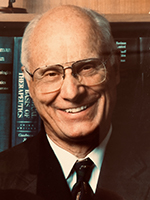 Kenneth E. Moore received BS and MS degrees in pharmacy
from the University of Alberta in 1955 and 1957, and PhD in Pharmacology from the University of Michigan in 1960. He began his academic career as a faculty member at Dartmouth Medical School in 1960, and in 1966 he joined Michigan State University
Medical Schools (MSU) as Associate Professor in the Department of Pharmacology. He remained at MSU for the remainder of his career, serving as Chair of the Department for 14 years, retiring as Professor and Chair Emeritus in 2001.
Kenneth E. Moore received BS and MS degrees in pharmacy
from the University of Alberta in 1955 and 1957, and PhD in Pharmacology from the University of Michigan in 1960. He began his academic career as a faculty member at Dartmouth Medical School in 1960, and in 1966 he joined Michigan State University
Medical Schools (MSU) as Associate Professor in the Department of Pharmacology. He remained at MSU for the remainder of his career, serving as Chair of the Department for 14 years, retiring as Professor and Chair Emeritus in 2001.
His early research involved the effects of toxins on energy metabolism and mitochondrial functions. He subsequently began studies on biogenic amines (norepinephrine, 5-hydroxytryptamine), first in invertebrates and then mammalian brain.
These studies led to a career path of exploring the effects of pharmacological and endocrinological manipulations on the dynamics of aminergic, primarily dopaminergic [DA], neuronal system in the brain. Using microchemical methods that
he and colleagues developed or refined, Dr. Moore demonstrated that DA neurons in the hypothalamus, which regulate the release of prolactin and α-MSH, differ significantly from the major ascending nigrostriatal and mesolimbic DA neurons.
His research was supported continuously from 1962-2000, by grants from the National Institutes of Health, including MERIT and Javits Awards. In 2005 he was the recipient of ASPET’s Torald Sollmann Award.
Moore had a primary role in developing pharmacology curricula in the three colleges of medicine at MSU. He coauthored with Richard Rech, one of the first psychopharmacology textbooks, Introduction to Psycopharmacology, 1971.
He was recognized in 1998 with the University’s Distinguished Faculty Award. Dr. Moore has been an active member of professional societies, including Member (1973) and Fellow (1976) of the American Society of Neuropsycopharmacology.
He has held a number of leadership positions with ASPET, including Finance Committee Chair, Secretary-Treasurer, President, and Chair of the Board of Publications Trustees.
Richard Neubig, MD, PhD
 Richard Neubig received his BS in chemistry from
the University of Michigan, MD from Harvard Medical School in the Harvard-MIT Program in Health Sciences and Technology, and PhD in pharmacology from Harvard University. He trained in internal medicine at University of Michigan Hospitals then
joined the faculty in the departments of Pharmacology and Internal Medicine. He became Chair of Pharmacology & Toxicology at Michigan State University in 2013. He has studied GPCR signaling for most of his career and currently explores
G proteins in genetic epilepsies. Since 2000, he has explored academic drug discovery, particularly related to cancer, scleroderma, and other fibrotic diseases as well as mechanisms and he is the co-founder of a start-up FibrosIX Inc. He was
the founding chair of the ASPET Division of Molecular Pharmacology and was an associate editor for the journal Molecular Pharmacology. He was on ASPET Council from 2009-2012 President of ASPET in 2013-2014. He received both the Astellas and
ASPET-Pharmacia awards for translational pharmacology. He has also been active in international pharmacology having served on the IUPHAR Receptor Nomenclature Committee from 2000-2015 for which he was GPCR co-chair. He is a Fellow of the American
Association for the Advancement of Science (AAAS) and is past chair of Section S, Pharmaceutical Sciences of AAAS.
Richard Neubig received his BS in chemistry from
the University of Michigan, MD from Harvard Medical School in the Harvard-MIT Program in Health Sciences and Technology, and PhD in pharmacology from Harvard University. He trained in internal medicine at University of Michigan Hospitals then
joined the faculty in the departments of Pharmacology and Internal Medicine. He became Chair of Pharmacology & Toxicology at Michigan State University in 2013. He has studied GPCR signaling for most of his career and currently explores
G proteins in genetic epilepsies. Since 2000, he has explored academic drug discovery, particularly related to cancer, scleroderma, and other fibrotic diseases as well as mechanisms and he is the co-founder of a start-up FibrosIX Inc. He was
the founding chair of the ASPET Division of Molecular Pharmacology and was an associate editor for the journal Molecular Pharmacology. He was on ASPET Council from 2009-2012 President of ASPET in 2013-2014. He received both the Astellas and
ASPET-Pharmacia awards for translational pharmacology. He has also been active in international pharmacology having served on the IUPHAR Receptor Nomenclature Committee from 2000-2015 for which he was GPCR co-chair. He is a Fellow of the American
Association for the Advancement of Science (AAAS) and is past chair of Section S, Pharmaceutical Sciences of AAAS.
Charles O. Rutledge, PhD
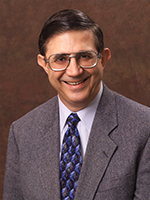 Charles O. Rutledge is a pharmacologist
with expertise in the actions of drugs on the central and peripheral nervous systems. He received his PhD from Harvard University in 1966 and studied with Nobel Laureate Arvid Carlsson in Gothenburg, Sweden on a NATO postdoctoral fellowship
the following year. Along with his students and fellows, he described the detailed mechanism by which amphetamine reverses the neuronal uptake carrier to cause efflux of biogenic amine neurotransmitters from the nerve endings.
This action explains the powerful behavioral actions of this drug. Another series of studies examined the microenvironment of the neuronal membrane in which alteration of membrane fluidity in the vicinity of the membrane carrier changes
its transport characteristics for catecholamine neurotransmitters.
Charles O. Rutledge is a pharmacologist
with expertise in the actions of drugs on the central and peripheral nervous systems. He received his PhD from Harvard University in 1966 and studied with Nobel Laureate Arvid Carlsson in Gothenburg, Sweden on a NATO postdoctoral fellowship
the following year. Along with his students and fellows, he described the detailed mechanism by which amphetamine reverses the neuronal uptake carrier to cause efflux of biogenic amine neurotransmitters from the nerve endings.
This action explains the powerful behavioral actions of this drug. Another series of studies examined the microenvironment of the neuronal membrane in which alteration of membrane fluidity in the vicinity of the membrane carrier changes
its transport characteristics for catecholamine neurotransmitters.
Dr. Rutledge began his academic career in the School of Medicine at the University of Colorado in the Department of Pharmacology. He moved to the University of Kansas in 1975 where he became the Head of the Department of Pharmacology and
Toxicology in the School of Pharmacy. In 1987, Dr. Rutledge became Professor of Pharmacology and Dean of the Schools of Pharmacy, Nursing and Health Sciences at Purdue University. He has also served numerous professional organizations
including President of the American Society of Pharmacology and Experimental Therapeutics (ASPET) (1996-97), President of American Association of Colleges of Pharmacy (1996-97), and Treasurer of Federation of American Societies for Experimental
Biology (1994-96). He is currently chair of the ASPET Investment Subcommittee of the Finance Committee (1998-present). He was Field Editor for the Journal of Pharmacology and Experimental Therapeutics and Editor of Biogenic Amines.
Dr. Rutledge has been a member of two NIMH Review Committees and the NIGMS Pharmacological Sciences Review Committee, which reviewed training grants in the pharmacological sciences. In 2001, Dr. Rutledge became Director of Discovery
Park. In August 2002, Dr. Rutledge retired as Dean and in November assumed the additional responsibilities of Interim Vice Provost for Research. He was recipient of the 2002 Rho Chi Lecture Award and Governor Frank O’Bannon
granted the distinguished Sagamore of the Wabash award to Dr. Rutledge in June of 2002. In May 2005, Dr. Rutledge was named the Vice President for Research at Purdue University. Effective January 1, 2008, Dr. Rutledge retired as
the Vice President for Research and served as Director of Special Projects on a part-time basis until June 30, 2008. On July 1, Dr. Rutledge was named Dean Emeritus of Pharmacy, Nursing and Health Sciences and Vice President Emeritus
for Research.
Elaine Sanders-Bush, PhD
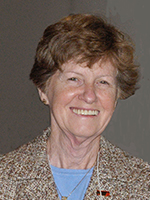 Elaine Sanders-Bush earned the PhD degree in Pharmacology at Vanderbilt University in 1967 and, after postdoctoral training, joined the Vanderbilt faculty in 1969. She remained at Vanderbilt throughout her career.
Elaine Sanders-Bush earned the PhD degree in Pharmacology at Vanderbilt University in 1967 and, after postdoctoral training, joined the Vanderbilt faculty in 1969. She remained at Vanderbilt throughout her career.
A postdoctoral with Dr. Fridolin Sulser at Tennessee Neuropsychiatric Institute spawned Dr, Sanders-Bush’s career-long interest in serotonin. Her research made major contributions to the discovery and understanding of serotonin receptors, from pharmacology and signal transduction to in vivo brain function. In the late 1980s, she spearheaded research that led to the discovery of a second major class of serotonin receptors - the 5-HT2 subtype, which activates phospholipase C and generates novel second messengers. Her research success brought her broad recognition at a national and international level, including a MERIT Award from National Institute of Mental Health (1995-2005).
Dr. Sanders-Bush was a leader in the development of neuroscience research and graduate education at Vanderbilt. In 1997, she directed the creation of a highly successful Ph.D. degree program in Neuroscience. Over the course of her career, she mentored dozens of graduate students and postdoctoral fellows, many of whom went on to distinguished careers. She had a deep personal commitment to enhancing opportunities for minority trainees and worked to enhance minority training, both locally and nationally.
Dr. Sanders-Bush was elected President of ASPET in 2006. She was a valuable member of ASPET for more than 40 years, serving in many ways, including membership on the ASPET nominating committee,1993-94, and again in 2008-2009, on the ASPET Committee for Diversity, 2007-2009, and on the ASPET council from 2005-2008. She also was a field editor for Journal of Pharmacology and Experimental Therapeutics (1992-1994) and served on the editorial board of Molecular Pharmacology (2000-2009).
Palmer Taylor, PhD
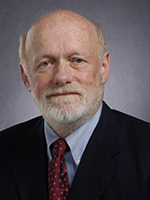 Palmer Taylor served as founding Dean of the Skaggs School of Pharmacy & Pharmaceutical Sciences and Associate Vice Chancellor of Health Sciences, since its inception in 2002 until 2016 at the University
of California, San Diego. Previously, he was founding Chair of the Department of Pharmacology, the first School of Medicine basic science department at this UC campus. Taylor holds The Sandra & Monroe Trout Chair of Pharmacology.
He was elected to the National Academy of Medicine, as a fellow of the AAAS and was awarded the Chevalier dans l’Ordre de a Legion d’Honneur in France, the Volwiler and Revelle service awards. He served as President of the American
Society for Pharmacology & Experimental Therapeutics, a member of the Scientific Advisory Councils of the National Institutes of General Medical Sciences and Environmental Health Sciences of NIH, and a Trustee of The Gordon Research Conferences.
Palmer Taylor served as founding Dean of the Skaggs School of Pharmacy & Pharmaceutical Sciences and Associate Vice Chancellor of Health Sciences, since its inception in 2002 until 2016 at the University
of California, San Diego. Previously, he was founding Chair of the Department of Pharmacology, the first School of Medicine basic science department at this UC campus. Taylor holds The Sandra & Monroe Trout Chair of Pharmacology.
He was elected to the National Academy of Medicine, as a fellow of the AAAS and was awarded the Chevalier dans l’Ordre de a Legion d’Honneur in France, the Volwiler and Revelle service awards. He served as President of the American
Society for Pharmacology & Experimental Therapeutics, a member of the Scientific Advisory Councils of the National Institutes of General Medical Sciences and Environmental Health Sciences of NIH, and a Trustee of The Gordon Research Conferences.
In general, his research employs spectroscopic, magnetic resonance, X ray crystallographic, and protein structure analyses to investigate molecular recognition. He has worked with nicotinic acetylcholine receptors (nAChR), acetylcholinesterase
(AChE) and neuroligin, since the mid-1970's with current interests in protein structure and dynamics related to drug design. For AChE, reactivating antidotes to volatile organophosphate nerve agents and insecticide exposure were developed
to confer bioavailability, blood-brain barrier penetration and achieve CNS reactivation with low toxicity. These studies evolved from collaboration with Barry Sharpless’ group, using AChE as the first target template to synthesize reactivator
antidotes in situ. Collaborative studies with nAChR structure-guided templates use a soluble surrogate for the extracellular domain of the nAChR to design drugs, selective for the a7 receptor subtype, that influence disorders associated
with nervous system development and ageing.
Lynn Wecker, PhD
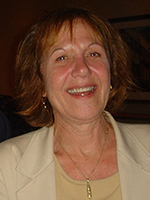 Lynn Wecker received her PhD in Pharmacology
from the University of Florida where she studied the effects of nicotinic receptor agonists. She pursued postdoctoral studies in the Department of Pharmacology at Vanderbilt University, where she contributed to our knowledge on the effects
of cholinesterase inhibitors on acetylcholine metabolism in brain and skeletal muscle. During this time she also demonstrated that sustained choline supplementation supports the synthesis of acetylcholine only when there is an increased
neuronal demand for or a limited supply of endogenous precursor. Further, she discovered that sustained choline supplementation increases the density of neuronal nicotinic receptors in the brain.
Lynn Wecker received her PhD in Pharmacology
from the University of Florida where she studied the effects of nicotinic receptor agonists. She pursued postdoctoral studies in the Department of Pharmacology at Vanderbilt University, where she contributed to our knowledge on the effects
of cholinesterase inhibitors on acetylcholine metabolism in brain and skeletal muscle. During this time she also demonstrated that sustained choline supplementation supports the synthesis of acetylcholine only when there is an increased
neuronal demand for or a limited supply of endogenous precursor. Further, she discovered that sustained choline supplementation increases the density of neuronal nicotinic receptors in the brain.
Dr. Wecker held faculty positions at several institutions prior to her move to the University of South Florida in 1990, where she served as Chair of the Department of Pharmacology and Molecular Therapeutics. At the University of South Florida,
Dr. Wecker's research focused on the regulation of neuronal nicotinic receptors in the brain, and demonstrated that a4 subunits of a4b2 receptors are phosphorylated by both PKA and PKC, and that serine site-specific phosphorylation plays a
role in receptor formation, maturation and expression.
Dr. Wecker has mentored many students and postdoctoral scientists throughout her career, and was instrumental in establishing the ASPET Mentoring Network. She also served as Program Chair, Secretary/Treasurer, and President of ASPET, as Treasurer
of FASEB, and as Chair of the Section on Pharmaceutical Sciences of the AAAS. She is also a member of the International Society for Neurochemistry, the Society for Neuroscience, the New York Academy of Sciences, and The Dana Alliance
for Brain Initiatives.
Dr. Wecker edited the 6th edition of Brody's Human Pharmacology released in 2018, and is currently Neuropharmacology Editor for Pharmacology and Therapeutics. She was given the title of Distinguished University Professor Emeritus
at the University of South Florida when she retired at the end of 2018.